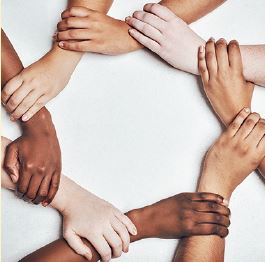Bridge of Hope Harrisonburg-Rockingham Faith Statement
What does it mean for Bridge of Hope Harrisonburg-Rockingham to be a Christian faith-based organization. The Faith Statement linked below was adopted by the Board of Directors, August 20, 2018 and was amended June 2021.
Mission & Values
Bridge of Hope Vision
Harrisonburg-Rockingham, a community where no family is homeless.
Bridge of Hope Mission
To engage Christian faith communities in ending family homelessness through neighboring relationships that demonstrate Christ’s love.
Bridge of Hope Values Statement
The Bridge of Hope network and partners embrace these values as we engage in ending homelessness for families, who are primarily comprised of single mothers and their children. Bridge of Hope is:
- Following Jesus
 We follow Jesus as our example in embodying love and holding out hope to homeless families.
We follow Jesus as our example in embodying love and holding out hope to homeless families.- We follow Jesus as we engage in mutual relationships with vulnerable families in a way that offers dignity, respect, and lasting impact.
- We follow Jesus, recognizing our triune God as our life source and depending on prayer to empower us to fulfill God’s purposes through Bridge of Hope.
- Embracing the Church
 We embrace the Christian faith communities (churches, Bible studies, house churches, etc.) as the vital link for ending homelessness for women and children.
We embrace the Christian faith communities (churches, Bible studies, house churches, etc.) as the vital link for ending homelessness for women and children.- We embrace groups of Neighboring Volunteers from within Christian faith communities that provide tangible supports, encouragement, and friendships that homeless and at-risk families need.
- We embrace and draw staff, board members, and Neighboring Volunteers from Christian faith communities who confess Jesus Christ as Lord and Savior.
- Choosing Hope
 We choose hope by respecting each woman and child participating in the program, regardless of race, ethnicity, faith, or life experience.
We choose hope by respecting each woman and child participating in the program, regardless of race, ethnicity, faith, or life experience.- We choose hope by building on each individual’s strengths and offering a solution to homelessness that emerges as all of us bring our strengths to the table.
- We choose hope by promoting transformation and positive changes which occur in the life of families facing homelessness, staff, Neighboring Volunteers, board members and other volunteers through their involvement in Bridge of Hope.
- Practicing Cultural Humility
 We practice cultural humility because our faith teaches us that everyone is our neighbor, equally valued and beloved by God.
We practice cultural humility because our faith teaches us that everyone is our neighbor, equally valued and beloved by God.- We practice cultural humility as the primary tool for advocating alongside those experiencing social injustices that perpetuate homelessness, including racism, sexism, and poverty.
- We practice cultural humility by equipping all who are involved with Bridge of Hope to grow and develop a deep understanding and utilization of the three tenets of cultural humility: life-long learning and critical self-reflection, recognizing and challenging power imbalances, and creating institutional accountability.
- We practice cultural humility by committing ourselves to becoming a network of staff, board, Neighboring Volunteers and supporters that represents the diversity of the kingdom of God.
Faith Statement of Bridge of Hope Harrisonburg-Rockingham
